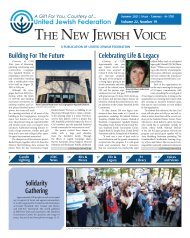You also want an ePaper? Increase the reach of your titles
YUMPU automatically turns print PDFs into web optimized ePapers that Google loves.
The message was clear. It<br />
was somehow instilled in<br />
me from a very young age:<br />
Hard work is something to be<br />
embarrassed about. Effort is a<br />
sign of weakness. It is hard to<br />
understand how this message<br />
was relayed. My parents always<br />
told me that as long as I<br />
worked hard in school, it didn’t<br />
matter what grade I received.<br />
My teachers encouraged us to<br />
study. And yet, somehow, there<br />
must have been subtle messages<br />
undermining what I was taught<br />
from my parents and teachers. I<br />
believed that “success” with less<br />
effort was more praiseworthy<br />
than hard and diligent work.<br />
Even as an adult, I look at those<br />
around me and focus more on<br />
the end product of “success.”<br />
I look at the people who just<br />
“have it” and wish that I did as<br />
well. I look at the people who<br />
have financial success, who<br />
have superior cognitive abilities,<br />
those who are fit and thin. The<br />
list can go on and on. Society<br />
has conditioned us to look at<br />
the success of others without<br />
thinking about what got them<br />
there. We look at people who<br />
seem to have it easy in some<br />
regard, who seem to have<br />
accomplished without even<br />
trying, and wish we had the<br />
same. We completely disregard<br />
the hard work and diligence that<br />
got them there.<br />
It turns out that the end product<br />
is the last thing we should be<br />
looking at. The process that<br />
got them there is far more<br />
important for their success than<br />
anything else. Angela Duckworth,<br />
a psychologist who founded<br />
the concept of grit, or passion<br />
and perseverance for long-term<br />
goals, has found in numerous<br />
research studies that grit is a<br />
very strong predictor of success.<br />
No innate intelligence, natural<br />
metabolism or inherited talent<br />
can replace what Duckworth<br />
calls grit. Grit has been found to<br />
be crucial toward one’s success<br />
in any area. Of course, talent<br />
and good luck can help one<br />
in many ways, but without the<br />
day-in and day-out of hard work<br />
healthy families<br />
toward a goal, one will not get<br />
very far. Grit is the ability to be<br />
passionate, set goals, work hard<br />
every day, and recover from<br />
failures and obstacles. While<br />
the end product of success may<br />
look magical to us, the true<br />
magic happens when we are<br />
passionate, hard-working and<br />
consistent. When we are gritty,<br />
we will surprise ourselves at what<br />
we can accomplish.<br />
In a way, we can think about<br />
grit as a set of good habits—<br />
habits that include goal setting,<br />
working hard, being diligent<br />
and doing it all consistently.<br />
These are positive habits that<br />
comprise one’s days and weeks<br />
and months and years. It is these<br />
habits that form our character,<br />
our work ethic, our meaning in<br />
life, and ultimately our success<br />
and satisfaction.<br />
Grit is not something that is<br />
set in stone. It is dynamic. We<br />
can become grittier. We can<br />
form habits and rituals that<br />
didn’t exist before. Psychologist<br />
Tal Ben Shachar explains that<br />
the reason why people are<br />
consistent with habits and not<br />
with New Year’s resolutions is<br />
that resolutions require discipline<br />
and willpower. Discipline and<br />
willpower are hard. But when one<br />
applies discipline and willpower<br />
consistently for a period of time,<br />
an amazing thing happens.<br />
Those things that were once<br />
hard to do become rituals and<br />
habits. They become things<br />
we just do—like brushing our<br />
teeth and taking our vitamins<br />
(maybe?). Once they are<br />
rituals and habits, we don’t<br />
have to fight nearly as hard to<br />
get them done.<br />
A personal example comes<br />
to mind. Years ago, when I<br />
was writing my dissertation, I<br />
had young children at home. I<br />
realized that the time of day<br />
that I would be most successful<br />
in getting writing done was in<br />
the early morning—before my<br />
children woke up. I decided<br />
that I had to train myself<br />
to wake up at 5 a.m. every<br />
morning, which would give<br />
me a solid two hours to work.<br />
I realized that at that time, I<br />
would be well rested and fresh,<br />
the house would be quiet and<br />
the phones would not be ringing.<br />
For the first few weeks it was a<br />
fight both to go to sleep early as<br />
well as to wake up at the crack<br />
of dawn. However, after a few<br />
weeks it became my routine. My<br />
body would be craving bed at<br />
a much earlier hour and waking<br />
up became easier too. The<br />
discipline and willpower required<br />
to maintain that schedule was<br />
not nearly as great and it<br />
became my daily ritual for two<br />
years. Once I became a doctor, I<br />
started sleeping late again.<br />
Thinking about grit and habits<br />
together helps us understand<br />
that the grittier we become,<br />
the less we have to fight to<br />
be that way. It becomes part<br />
of who we are. We can make<br />
gritty behaviors more habitual<br />
by picking one thing at a time<br />
and doing it consistently. Try<br />
it yourself. Think about your<br />
personal goals and choose<br />
something specific that will help<br />
you get closer to that goal. Do<br />
that specific thing consistently<br />
for a month or two. Watch<br />
the transformation happen—<br />
from something that requires<br />
willpower to something that is<br />
a habit. Once it is a ritual, you<br />
have become grittier already.<br />
Dr. Malka Ismach is a certified school<br />
psychologist and licensed psychologist who<br />
currently works in both school and private<br />
settings. She has experience working in multiple<br />
school, agency and clinical settings. Dr. Ismach<br />
has been trained in cognitive behavioral<br />
therapy (CBT), play therapy and parent<br />
training. She continues to receive ongoing<br />
training in evidence-based treatments for<br />
children, adolescents and adults. Dr. Ismach has<br />
experience and skill in assessing and treating<br />
a full range of mental health challenges.<br />
She brings enthusiasm and dedication to her<br />
work and values collaboration with schools,<br />
parents, medical practitioners and others<br />
in order to enhance the treatment<br />
of her clients. She is committed to<br />
providing compassion, support and<br />
emotional well-being to children,<br />
adults and families. She can be<br />
reached at<br />
mismach@drmalkaismach.com.<br />
59<br />
healthandheelsmagazine.com

















